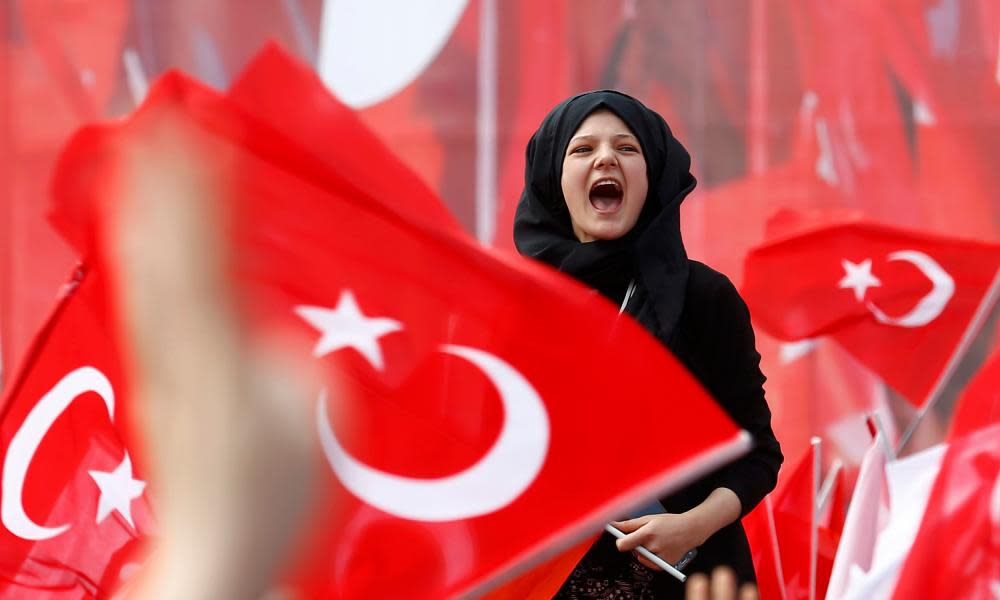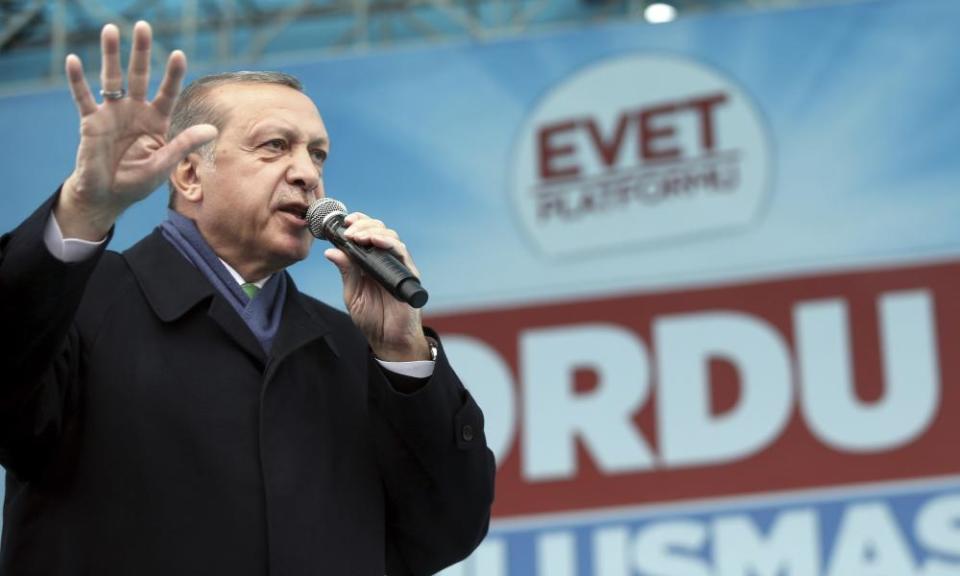Turkey prepares for tight vote that could strengthen Erdoğan's grip on power

Millions of Turks will head to the polls on Sunday to vote in a tight referendum race that could transform the country into a presidential republic, in what could be one of the most significant developments in the nation’s history since its founding after the collapse of the Ottoman empire.
The vote will cap two months of campaigning that has further polarised a divided country still reeling from a coup attempt in which 265 people were killed and hundreds injured, frequent terror attacks and the impact of the ongoing civil war in neighbouring Syria.
The run-up to the vote has been marred by divisive rhetoric and accusations on both sides that have amplified the splits within society. Supporters of the government have equated those who will vote no on the constitutional amendments with terrorist groups, and opposition campaigners have accused those who will vote yes of abetting fascism and dictatorship.
Little can be gleaned from the opinon polls. Polling on either side has shown vastly differing results, and the number of undecided voters or those who declined to tell pollsters how they will vote is reportedly much higher than in past elections or referendums, leaving a margin of error that makes much of the data meaningless.
The campaign has refocused attention on government abuses in the aftermath of the coup, including a purge that has gone far beyond those who backed the putsch to target those who oppose the policies of the country’s president, Recep Tayyip Erdoğan. Tens of thousands of academics, judges, law enforcement and military officers have been dismissed, and top opposition politicians and dozens of journalists have been arrested in the months leading up to the referendum.
It has also highlighted Turkey’s drift away from its western allies, from a candidate for European Union membership in Erdoğan’s early years to a state of open hostility with the bloc, whose leaders accuse the Turkish president of clamping down on freedoms while he calls them “Nazi remnants” and “fascists” that have been morally compromised by their treatment of Turkey and Syrian refugees.
“With God’s permission, on Sunday night, Europe will hear our voice,” local media quoted Erdoğan as saying at a rally on Thursday. “We will show them that Turkey is not the old Turkey after 16 April.”
Those taking part in Sunday’s referendum will vote yes or no to a series of constitutional amendments that will transform the country from a parliamentary democracy to a president-led republic. The new system would also allow Erdoğan to run for two more election terms, potentially ruling as a powerful executive until 2029.
The reforms would abolish the role of prime minister, lower the minimum age of MPs and expand their number, remove parliamentary oversight of ministers, allow the president to appoint more judges and retain his affiliation with his party, abolish military courts and allow for the impeachment of the head of state by the legislature.
Supporters of the reform argue it would create a “strong Turkey” whose economic growth would no longer be hampered by the acrimonious politics of coalition governmentsThey also say it would strengthen the government’s hand in the fight against terrorism, and bring more stability and prosperity for the country by giving it free rein to institute reforms.
They also say the changes would do away with the relics in a constitution that was passed in the early 1980s under military tutelage, and which by design created conflicts of power between the president and prime minister, limiting the abilities of prior governments.
Opponents argue that the changes will effectively lead to one-man rule and autocracy with Erdoğan at the helm. They point out that the ruling Justice and Development (AK) party has been in power for a decade and a half, but has failed to bring stability to a country struggling with repeated terror attacks, an influx of refugees, and an insurgency by Kurdish separatists in the south-east that has devastated cities in the region.

They also point to the wide-ranging crackdown on the media and opposition as an indication of the government’s autocratic tendencies and the unfairness of the contest. Few media outlets that are outright opponents of Erdoğan remain.
Cumhuriyet, the main opposition daily, has had nearly a dozen staff and board members arrested and its journalists are facing trials. The pro-Kurdish Peoples’ Democratic party (HDP), once a key source of hope for opposition activists and minorities who joined the movement, has had its two co-chairs imprisoned, including the charismatic opposition leader Selahattin Demirtaş. The party’s other chief, Figen Yüksekdağ, has had her parliamentary status revoked and is facing a possible jail sentence.
The referendum will also represent a vote of confidence or otherwise in Erdoğan himself. The first popularly elected president in Turkish history has already turned a largely ceremonial position into an influential role by sheer force of personality. If the constitutional amendments are approved, he could become the most powerful man in Turkey since Mustafa Kemal Atatürk, the founder of the republic.

 Yahoo News
Yahoo News 
